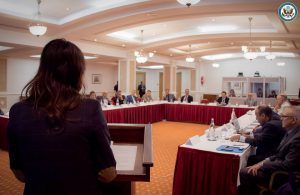By Sami Zaptia.

London, 9 May 2018:
The U.S. is to help Libya reform its electricity sector. In April the Libya Electricity Sector Reform Task Force held its first meeting in Tunis. It was organized by USAID and Libya’s state-owned monopoly, the General Electricity Company of Libya (GECOL).
In response to a request for further information about the deliberations of the April meeting and the aims of the Reform Task Force, the U.S. embassy in Tripoli (currently in Tunis), has provided Libya Herald with further details.
In early 2018, and as recommended by GECOL, the head of the Presidency Council Faiez Serraj authorized the Minister of Planning to form the Electricity Sector Reform Task Force. The Task Force was charged with the development of strategic policy, regulatory and operational measures to support a sustainable Libyan electricity sector.
The Task Force held its inaugural meeting on April 13, 2018. The Task Force will lay the groundwork for the eventual establishment of an independent electricity sector regulatory body for Libya. The creation of this Task Force is key to establishing the needed policies for electricity sector regulation as well as the regulatory authority with a clear mandate, separate from that of the GECOL.
The members of the Task Force have been chosen by the Presidency Council because they play a significant role in the electricity sector. They include customers, suppliers, and independent entities. The Task Force will meet once a month.
In the short-term, the Task Force will focus on the adaptation and recommendation of a clear GECOL-developed electricity sector policy which is based on international best-practice for electricity sector utilities, and the introduction of an independent regulatory authority for the electricity sector.
Through this Task Force, the Presidency Council is taking important steps to reduce waste and provide more access to electricity for all the Libyan people. U.S. assistance to Libya’s electricity sector is a response to a request from the Presidency Council to help identify causes of an ongoing electricity supply crisis in Libya and to recommend strategic actions to alleviate that crisis.
The U.S. Government is making expert advice available to support the work of the Electricity Sector Reform Task Force as it seeks to improve reliable electricity to the people of Libya.
The U.S. Agency for International Development (USAID) is helping GECOL consider best practices of well-run international electric utilities and providing technical assistance to help implement specific activities.
USAID will conduct workshops for GECOL staff, and other electricity sector stakeholders, highlighting best-practices in commercial loss reduction, energy conservation and revenue enhancement.
With USAID assistance, GECOL developed the Electricity Sector Reform Roadmap in 2017. The goals of this Roadmap are:
- Create a financially self-sustaining electricity sector.
- Provide universal access to electricity for all customers willing to pay for the service, taking into account affordability.
- Ensure reliable supply.
- Encourage private sector participation and involvement to support electricity service delivery and economic growth, including investment in large scale electric infrastructure projects.
GECOL has taken steps to improve Libya’s access to electricity by re-establishing the high voltage transmission connection between the Western and Eastern part of the transmission grid and by Installing off-grid solar power in a hospital in Sabha.
Looking forward, to ensure the long-term survival of the electricity sector, GECOL is planning to take the following steps:
- Reduce and eliminate customer electricity curtailments resulting from electricity shortages. Reliability is a cornerstone of a well-functioning electricity sector.
- Reduce commercial losses which have resulted from a combination of below-cost tariff charges, technical losses, electricity theft, under-billing, and non-payment of billed charges. Currently, to keep GECOL operating, the government subsidizes this huge deficit. Significantly improving the cost-efficiency and sustainability of electricity service provision in Libya will require a drastic reduction in the commercial losses.
- Improve its accounting and recordkeeping to properly track commercial losses to accurately account for commercial losses, institute best practice compliant accounting records must be created for operational, regulatory and financial purposes and adhere to principles established by the International Accounting and Financial Reporting Standards Board (IFARS).
- Roll out the Electronic Invoicing and Notification System, installed at GECOL with USAID assistance to improve billing and collections, and consolidate its billing systems into one centralized system. In addition, introduce and improve mobile payment technology so that more customers can pay their bill by phone.
- Adopt energy conservation measures to reduce demand and waste so that the electricity supply can be managed more efficiently. USAID has and continues to introduce to GECOL international best practices in energy conservation, including benefits derived from replacing traditional incandescent light bulbs with high efficiency LED light bulbs, and others.







